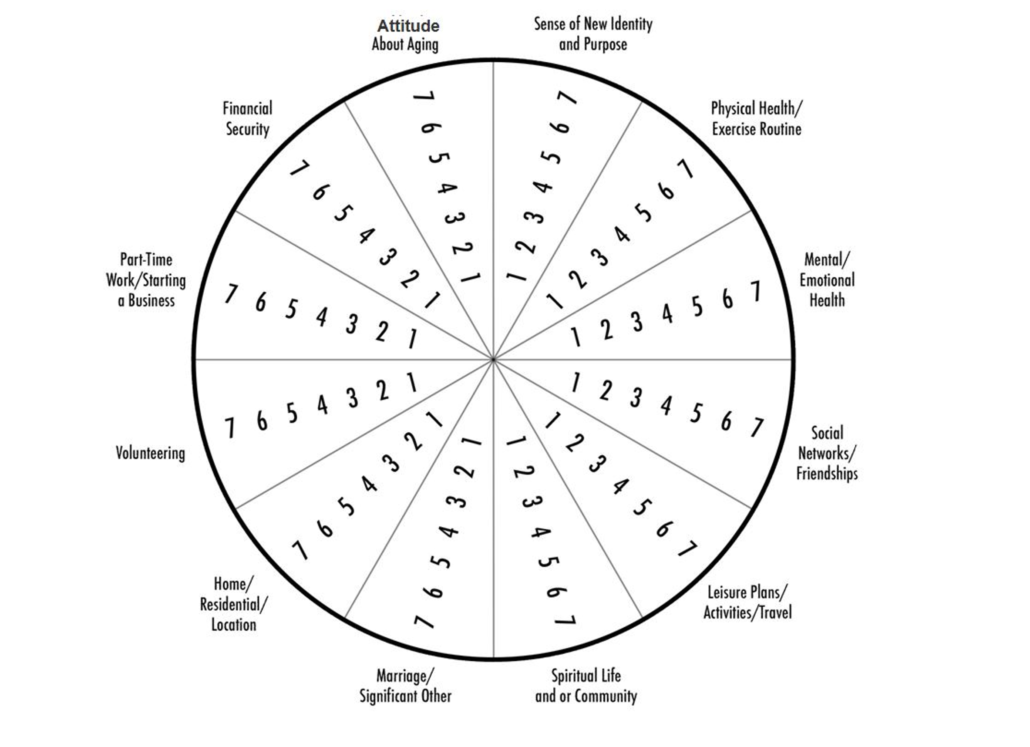The average life expectancy is 78 years, while the retirement age is 67. We work for 50 years to be free for 11. Does that sound like a fair deal?

Alas, that final 20 doesn’t materialize for lots of folks. What I find perplexing is why we refuse to acknowledge that it is the very act of retirement that may keep that final nirvanic 20 from happening.
HELLOOOO!
Perhaps we should awaken to the fact that retirement, which means to “withdraw”, “go backward”, “retreat to a place of safety and seclusion” is an unnatural act that goes against our biology and neurology.
Retirement is an unnatural act. It doesn’t exist in nature (have you ever seen a retired coyote, bear, turtle, maple tree?) and it didn’t exist anywhere in the world 150 years ago. Its origin (Germany, 1880’s; U.S., 1935) was purely political, not humanitarian.
Ever heard the phrase “use it or lose it”? Traditional full-stop, off-the-cliff, labor-to-leisure retirement takes us in the direction of “losing it” mentally and physically.
We are made to grow, learn, serve, contribute regardless of age. Our Euro-American concept of retirement says “you’re done” at a certain age. In the U.S. that’s 65, an arbitrarily chosen age that establishes an “artificial finish line” that has nothing to do with anything other than the fact that we decided to pick that number 86 years ago for political reasons when the average life span was 62.
So, is it a “fair deal”?
I say “hell yes” – with the caveat that decisions have consequences.
If you decide to fully retire, then be prepared to accept the potential negative consequences of the deal that you struck with your mind and body. Your mind and body will play the cards you deal them.
If you choose to retire physically and become sedentary, your body will respond in kind. If you choose to retire mentally and become one with the La-Z-Boy and TV, your brain will respond accordingly. If you retire and become a hermit and socially isolated, both your mind and body may reward you with early senescence.
We ignore what medical and bio-scientific research has learned over the last 50 years about how we work biologically and neurologically. We will lose some brain size as we age but we don’t lose brainpower unless we choose to. Our bodies can remain strong much longer into late life than we give them the chance to do.
What is a fair deal?
Maybe a better deal is the type struck by those who don’t retire. The world is replete with examples counter to the “unfair deal” that our Euro-American concept of retirement has wrought. Studies of centenarians across the world have revealed that rarely do they retire. The cultures on the planet with the longest average life spans don’t have retirement in their vocabulary nor do they have retirement homes.
Maybe it’s time to rethink the whole concept of retirement. In fact, that time has come. Many are doing just that, recognizing that we’ve been conned into believing that retirement is the “right deal” only to discover that the rewards promised by the concept aren’t always there upon arrival.
There is a growing movement away from traditional retirement into unretirement or to semi-retirement. Many are recognizing that the second-half or third-age of life is a time for a new “take-off” and not a “landing.” Those of us who advocate for this attitude have a battle on our hands, facing rampant ageism, the powerful youth culture-orientation at the corporate level, stupid government policies, and the pervasiveness of the entitlement attitude so powerfully cultivated by the 20th-century indoctrination and financial services industry.
Most centenarians have the real “fair deal”.
They:
- Don’t retire
- Keep working
- Pay attention to their biology – stay active physically and mentally
- Give back, pay forward, share their wisdom
- Don’t go with the crowd
Research of centenarians revealed that only 3 1/2% retired and 92% worked for over 60 years. Work seems to be a biological necessity.
Strategic Coach founder, Dan Sullivan, is arguably the most successful entrepreneur coach on the planet and a favorite virtual mentor of mine. He proudly feels he has successfully “disenfranchised” most of the 18,000 entrepreneurs he has trained from the idea of retirement.
He tags retirement as the “ultimate casualty.” In his view, “stopping to retire means you are ready to return your bits back to the universe.”
A retired Stanford psychologist refers to retirement as “statutory senility.”
I’ve heard it referred to as a “shortened path to the ultimate leisure – death.”
A time of trampolines
I’ll share a quote from a favorite book, “Dare to Be 100”, written by retired Stanford geriatric physician, Dr. Walter Bortz. Step #59 of his “99 Steps to 100” is entitled: “Think When, Where, and Why Retire.” Within that step he says:
“Retirement should be viewed not as a time of rocking chairs but of trampolines – try out things that have intrigued you, but were never before open to exploration. Think of retirement not as an end but as a beginning, a graduation, a whole set of new opportunities that can enrich and reward. Retirement is an active – not a passive – process. Anticipate it decades in advance, plan for it, and execute it in a well-rehearsed fashion. Of course, this does not imply that it should be rigid in outline. Keep your options open – give new directions a chance.”
Sage advice from a sage who is 91 years old and still out there advocating for robust aging.
Do you have a plan for your “third age?”
Are you into or heading into that “final 11?” How ready are you for this life phase? Regardless of where you are financially, it’s good to start with a baseline. Here’s a simple tool – let’s call it a Retirement Transition Wheel to help establish where you are in 12 key areas of a successful transition into a purposeful third age. Select your level of comfort or satisfaction for each area and see where your wheel is out of balance. It should provide clues to what work needs to be done to achieve a successful, healthy, and purposeful third age.

Life is simply a series of choices. Nowhere on the full lifescape are the choices more critical than those made during this transition phase. Traditional retirement is a stale narrative and one of those options that we are discovering may not be the wisest choice.
Let us know how you feel about all this? We know that 2 of 3 retirees have entered retirement without a non-financial plan. If you are the exception, we’d like to know what worked and what you would do differently. If you aren’t retired, are you beginning to view it differently? Or does traditional retirement still appeal to you? We appreciate and grow from your feedback. Leave us a comment or drop an email to gary@makeagingwork.com





“Retirement has become a pseudo-entitlement, an earned right …” Couldn’t agree more! And therein lies a huge hurdle. We need to find or create work we love instead of waiting out a job that depletes us.
BH
As a behavioral neurologist I totally agree.
Trying to cancel mandatory retirement a 67 YO.
Can you help?
Provide a Q&A tool so that our answers could be quantitatively and qualitatively measured. Identifying which questions need a higher score would also be helpful.
We both retired at 55, but continued to volunteer with youth groups and community organizations. Later started Suppers and Brunches as fundraisers for a Community and a Legion Branch. Retired again in our mid 70’s then organized a seniors club for the county which spread to provincial And us delegates to the National now retired, again at 83.
At 68 I am learning to play the piano, will stop doing my part-time Private Investigator work at 68 and do volunteer work. Gotta have a purpose.
I “retired” at 67, got both knees replaced over the next 6 months, then spent two years getting a Masters Degree. I didn’t intend to go back to “work”, but I did get a job in a new position that filled me in creative new ways. Hallelujah!!
Wow Gary here I am when most people my age late 50s consider retirement yet because I completed my teacher credential way back in 2004 I can now teach virtually without stepping foot in a school. I mean I can keep teaching online for many years that keeps my brain busy plus I live a low-maintenance low-stress lifestyle. I am planning to live and work abroad hopefully that will take me to a 100 and beyond. I am not ashamed when I tell people that retirement is out of my life picture. Thank you Gary.
he blog was how do i say it… relevant, finally something that helped me. Thanks
Hello makeagingwork.com admin, Thanks for the well-researched and well-written post!
Hi makeagingwork.com administrator, Your posts are always insightful and valuable.
To the makeagingwork.com administrator, You always provide valuable feedback and suggestions.
Hello makeagingwork.com owner, Your posts are always well-received and appreciated.
Hi makeagingwork.com admin, Thanks for the valuable information!
Hello makeagingwork.com owner, Your posts are always well thought out.
Dear makeagingwork.com owner, Your posts are always insightful and valuable.
Hello makeagingwork.com webmaster, Your posts are always well-written and easy to understand.
Hi makeagingwork.com administrator, You always provide great resources and references.
To the makeagingwork.com administrator, Thanks for the well-researched and well-written post!
Hello makeagingwork.com administrator, Your posts are always well-written and easy to understand.
Hi makeagingwork.com admin, Your posts are always well researched and well written.